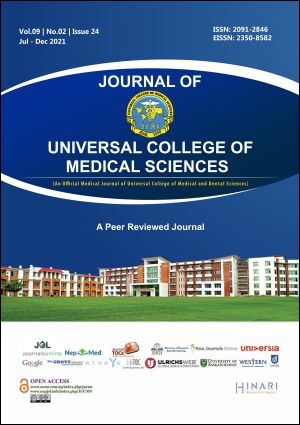Study on the Prevalence and Associated Factors of Perceived Stress on COVID-19 Among Healthcare Providers in Rupandehi District Health Institutions, Western Nepal
DOI:
https://doi.org/10.3126/jucms.v9i02.41991Keywords:
COVID-19, Healthcare providers, Perceived stressAbstract
INTRODUCTION: Healthcare providers (HCPs) though stood as front-liners during the crisis situation were not themselves immune to the psychological consequences due to COVID-19. The present study aimed to find the prevalence of perceived stress on COVID-19 pandemic and its associated factors among health care providers in Rupandehi district health institutions.
MATERIAL AND METHODS: This cross- sectional study was conducted among the HCPs in the institutions of Rupandehi district in Western Nepal, from August to November, 2020. Total 126 subjects were included and probability sampling technique was applied for sample collection. After written consent from participants socio-demographic data were collected and Perceived Stress Scale (PSS-10) was applied.
RESULTS: The study showed the prevalence of perceived stress in COVID-19 HCPs found to be 65.1% considering score 20 as cut-off. Age, work place, precaution measures taken and staying with family were statistically significant with the perceived stress level (p<0.05). Multivariate logistic regression showed perceived stress level had statistically significant association with precaution means and work place of HCPs. Healthcare providers who had unsatisfactory precaution means followed at work were 2.66 times more likely to have perceived stress as compared to satisfactory precaution means as adjusted odds ratio (AOR) = 2.66 (1.09-6.51). Healthcare providers who stayed with family members were 2.28 times more likely to have perceived stress level as AOR=2.28 (0.94-5.52).
CONCLUSION: The study showed increased prevalence of perceived stress among HCPs during the initial stage of COVID‐19 pandemic in Nepal. Considering the findings, there is urgent need to develop and implement appropriate stress management and coping strategies to the target group.
Downloads
Downloads
Published
How to Cite
Issue
Section
License
Copyright (c) 2021 Journal of Universal College of Medical Sciences

This work is licensed under a Creative Commons Attribution-NonCommercial 4.0 International License.
Authors have to give the following undertakings along with their article:
- I/we declare that this article is original and has not been submitted to another journal for publication.
- I/we declare that I/we surrender all the rights to the editor of the journal and if published will be the property of the journal and we will not publish it anywhere else, in full or part, without the permission of the Chief Editor.
- Institutional ethical and research committee clearance certificate from the institution where work/research was done, is required to be submitted.
- Articles in the Journal are Open Access articles published under the Creative Commons CC BY-NC License (https://creativecommons.org/licenses/by-nc/4.0/)
- This license permits use, distribution and reproduction in any medium, provided the original work is properly cited, and it is not used for commercial purposes.




